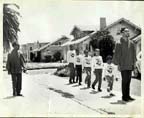| cobb
static
|
|
the subtitle is kwanzaa
|
February 1999
I returned to the practice of celebrating Kwanzaa about 7 years ago when I was living in Brooklyn. On Saturdays I spent my mornings teaching school age children at St. Luke’s church in Harlem, right down the block from city college. After a time, as one would expect, I grew rather fond of and attached to these kids.
That fall, we arranged a field trip over to rural jersey to go apple picking. Johann, the young priest who ran the program had suggested this as part of a harvest mass in the church calendar. While we were over in jersey we got huge bags of apples and a few giant pumpkins to boot. The mass was a great success; it's always pleasant when you can excite young people to participate in church and I was feeling pretty good. But as this rite progressed I was shocked into recognition. This was Kwanzaa all over again - and watching these kids took me back to my own childhood.
We agreed to celebrate the Karamu on one Saturday instead of attempting to do the entire 7 day rite. I would lead. Some of the adults were concerned that it not be commercial or phony like the big Kwanzaa / black expo being advertised on the radio. Some of them had gone in prior years to the convention center and considered it all a big hustle. I shared their concerns.
I did a lot of reflection on why I hadn't celebrated it, and what it would mean to do it once again, since I was there at the very beginning and celebrated the first Kwanzaa in 1966 as a 5 year old kid. Our family had foregone Christmas to celebrate Kwanzaa and did so for several years. I came to the conclusion that I had become too secular - that exactly the kind of spirit Cornel West had been talking about was missing from my own dialog with the black community. Here I was teaching kids math and science and geography. Here I was writing essays and hanging out on the New York spoken word scene. Here I was having spirited debates on things like black cultural production (oh god can I recall how much we went on about Terry McMillan vs. Julie Dash vs. Ousman Sembenne vs. Living Colour...) But in my real community work, I was teaching sterile things. I wasn't communicating, other than through force of personality, any of the spirit of where my energy was coming from. I exemplified something 'positive' but I never explained that something. We debated the meaning of being black (and how we should teach black children (for days)) but I wasn't sharing what it meant to me, and how I came to be the man I am.
So there was a great deal of rediscovery and rededication in my approach to the celebration. As the elder, I was to be the caretaker of spirit for this occasion. I bought a new kofi, and borrowed my cousin's full length boubou for the occasion. I encouraged everyone to get some clothes or something - even if it was just a pin - to wear. One of the ladies brought some cloth to wear as sashes for kids who had nothing else. I photocopied some terms and passed them around.
That Saturday we sat in a circle on the raised stage in the parish hall for our Karamu. I started it off with a hearty harambee! And made sure everyone responded loud and clear. Habari gani, I said. Njama asante sana, they replied. It was just like the good old days, and corny too - like the kids on that old Stevie Wonder black history song. There were four or five adults and twice as many children in our circle, and we went through the Nguzo Saba each telling a story of how they've seen it and how they might practice it in the future. We sang Kumbaya and passed the libation. The libation was solemn and tearful, certainly more for us adults than for the children. For this was a kind of sharing we were unaccustomed to doing, and it shamed us and elated us at once. It was a transformation I can still feel, the bunch of us that cold winter day in Harlem.
When it was over, we all promised to do it again next year. But for me it was not to be. I moved to Boston, the coldest city in the world.
I married the following year and my family have practiced a small and simple ceremony along the full 7 days. We made our own Kinara and sanctified a few other household objects too. The broom from our wedding is part of the ceremony these days, and we tend to use a lot more candles, turning off all the electric lights in the house.
When we moved back to California, I was somewhat surprised to know that my father had returned to the celebration as well. It was his decision to break with Karenga and Kwanzaa long ago. He had a serious problem with Karenga the man, whose ego was unrestrained and consequently made for a poor leader, thus the eventual demise of Us.
We had the final Karamu at his house Kwanzaa before last which included some neighbor's children. I remember this Kwanzaa in particular for his seriousness when one of the children got a case of the giggles as another was speaking. He explained in a tone whose gravity shocked me why this, of all times, was not one where we should be laughing at each other. Silliness was put to rest. In the end, it was a great celebration, with about 20 family and neighbors in attendance. A reunion of sorts, older, wiser and much better.
mbowen
